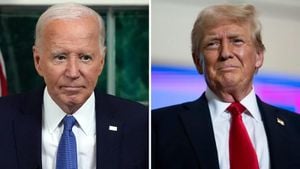Political maneuvering has reached new heights in North Carolina, with the recent actions of the Republican-controlled legislature sparking considerable controversy. Outgoing Governor Roy Cooper, a Democrat, has taken the unprecedented step of vetoing legislation aimed at stripping powers from several soon-to-be Democratic holders of statewide offices. This bill, pushed through the General Assembly during what is known as the lame-duck session, is seen by many as nothing short of a political power grab.
The legislation, which was introduced and fast-tracked within 24 hours, is primarily seen as another tactic by the GOP to maintain influence over state politics after losing pivotal elections. Notably, the bill would remove the incoming governor’s ability to appoint the state elections board, thereby hindering the authority of Gov.-elect Josh Stein and similarly affecting the newly elected attorney general, State Schools Superintendent, and lieutenant governor—all of whom are Democrats.
Critics have labeled this move as blatant partisanship, with many arguing it is part of the broader trend of Republican lawmakers attempting to undermine Democratic leadership. The GOP has defended the changes as necessary adjustments to improve governance and accountability, but critics insist it reflects desperation and fear of losing power.
An analysis of the situation reveals deep divisions within North Carolina's political climate, culminating from years of fierce competition between the two major parties. Notably, this legislative action follows the recent victory of Democrats across various state offices, including key positions such as the attorney general and lieutenant governor. This victory continues to send ripples through the state’s political framework.
Democratic leaders, including Cooper, have fiercely criticized the bill, asserting it reflects the lengths to which the GOP will go to entrench power. “This bill is not just about governance; it’s about control,” said Cooper during his announcement of the veto. He believes it threatens democratic processes and undermines the voters’ choice to elect their officials freely.
The urgency and rapidity with which the legislation was pushed through both the House and Senate have raised eyebrows among commentators and ordinary citizens alike. Many are left wondering what this could mean for the democratic process moving forward. Do the recent maneuvers from the GOP signal the dawning of increased partisanship and obstructionism?
Supporters of the bill argue it was necessary to maintain operational efficacy within the state’s various governmental bodies. They posit it reflects necessary reforms to reduce the influence of political appointees and increase performance oversight within major state departments. Yet, many counter-argue such changes have been implemented to stifle what many refer to as “the voice of the people.”
With midterm elections approaching and heightened emotions underlying this political skirmish, North Carolina could see its political battlelines redrawn yet again. The repercussions of this power struggle could resonate beyond the Old North State as other Republican-controlled states may look to follow suit, testing the limits of executive authority and the balance of power between governors and legislatures nationwide.
Legislators and the public alike are now keeping a close eye on how the situation develops: will the veto hold? What will happen if Republicans manage to override it? The tension between party loyalty and governance will likely continue to dominate the narrative leading up to the new administration.
For many observers, the controversy is not merely legal but part of broader cultural and ideological disputes, reflecting the clash of values evident across the U.S. on issues ranging from voter accessibility to election integrity. The debate regained traction as both sides rallied supporters to voice their opinions on the streets, at rallies, and through social media, framing the discussion not only as political but deeply personal.
Meanwhile, prominent figures within the Democratic camp have taken to national media outlets to amplify their concerns, arguing the Republican-led legislature's tactics signal their lack of respect for electoral outcomes. The criticisms have sparked discussions about the ethical boundaries of legislative actions and the responsibility of elected officials to uphold democratic standards and principles.
While many Democrats feel empowered by their electoral wins, the swift legislative action by the GOP leaves some questioning whether this trend will be effective long-term or if it could lead to voter backlash and renewed interest among the electorate to advocate for checks and balances.
The outcome of this confrontation may well determine the future of governance in North Carolina for years to come. Will the Republican-led legislature face consequences at the polls, or will they succeed at solidifying their power and enacting change prior to the Democratic leadership taking control? Only time will tell. For now, the focus remains centered on whether the veto will stand and how each party navigates the fallout of this high-stakes power grab.



